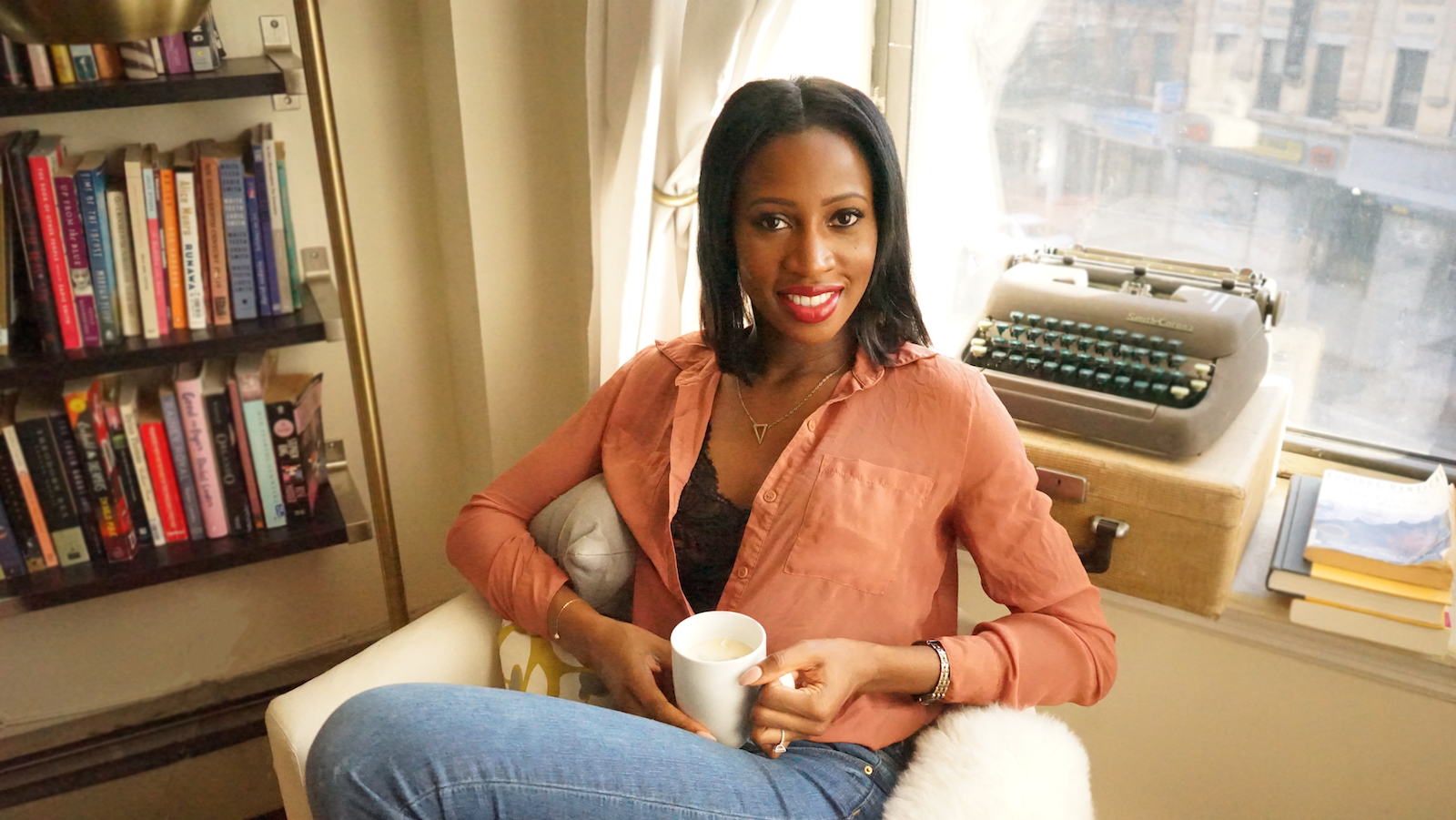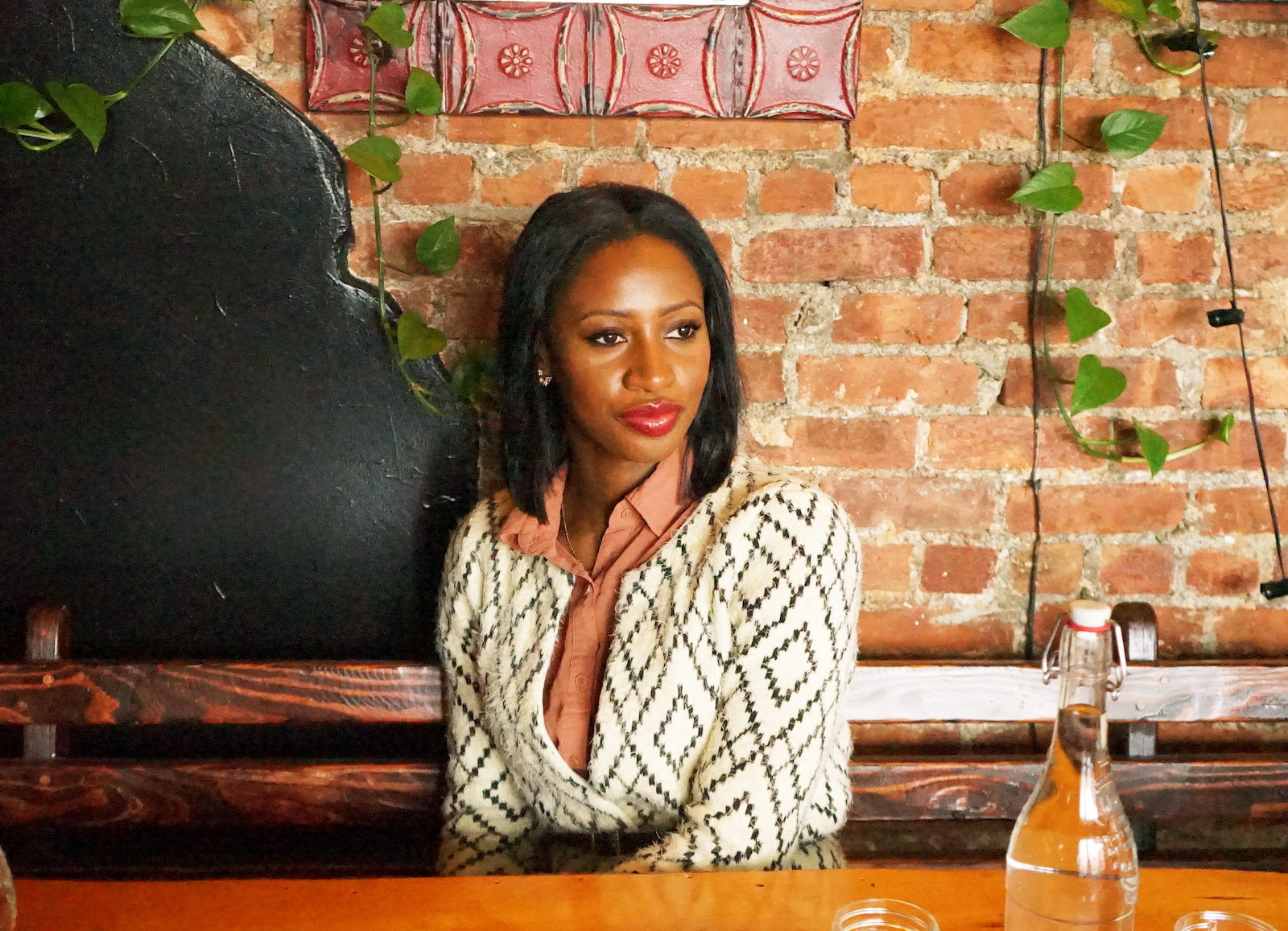
Wayetu Moore on How Love and Liberia Shaped Her Debut Novel
March 8, 2018
Wayétu Moore is the type of person who’s always busy, but when you meet with her, she seems to have an innate gift of stillness — a human “calm before the storm” if you will. At any given time, the New York City-based writer is always juggling an array of projects, and as of this moment, she gearing up for the launch of her first novel (She Would Be King, Graywolf Press) while simultaneously planning her August wedding. She’s also a prolific Instagram-famous haiku poet (find her at @wayetu), working on a Masters in Anthropology at Columbia University, and is a non-profit children’s book publisher.
We catch up with the multitalented Moore at her Brooklyn apartment where she shares her tale of being a child escaping the bloody civil war that ravaged Liberia from 1989 to 1997 to an author on the brink of her debut.

What’s your history?
Wayétu Moore: I was born in Liberia and grew up in Texas. My family moved here (to NYC) because of the war when I was five in 1990, and the memories that I have are two extremes: very idyllic and very traumatic. My mom was at Columbia at the time, and we lived in her dorm room until she graduated for her last semester and then we moved to Connecticut, then we moved to Memphis, then we moved to Texas when I was eight, and that’s where I was raised. That’s what I call home now when people are making the reference at least domestically, and home home is Liberia.
Do you find comfort in having a very fluid sense of home?
I do find comfort in the fact that I have that background. I think what it did was it made me, as well as my siblings, able to make anywhere home. We identify home as when we’re all with each other, as opposed to one physical place. But obviously the disadvantage of this is that you crave solidity and feeling settled and groundedness, and then you also struggle with restlessness. Like I struggle with a little bit of restlessness and not being able to sit still, and I think maybe some of that stems from my early childhood.
Do you think New York is the place you decided to settle because of this restlessness?
Absolutely, without a doubt. New York is the place that calms me down because it’s a place that I can call home that is itself unsettled. The first time I moved to New York was 2002. I was seventeen and I was studying theater at NYU and I attended for about a year, took a leave of absence for a year, and I returned for a semester, and then I transferred to Howard.
Why did you decide to leave theater?
I think theater left me in a lot of ways. I had this ridiculous experience. I produced this play, and I was so young — I was eighteen — and it was getting featured in various magazines and there was a lot of hype around it. It was supposed to run for seven weeks but it ended up only running for two. It closed because the attendance was so poor. The first night, there were about three or four people there. And so I think that’s why I’m a bit averse to hype now. When things happen or there’s a lead-up to a project or something else I’m working on, I tend to be unaffected and fairly skeptical of it. That has its disadvantages in that you don’t fully appreciate or celebrate the moments that you should.
After that experience with the show, I went back to Texas and I cried for six months. During the time I was in Texas, my parents had encouraged me to get involved with non-profits, so that was my introduction to the non-profit world even though non-profit sensibility had always existed in my household.
So, when I returned to NYU, I’d been so disillusioned, that I started to ask myself questions like, “What am I actually giving back? Maybe there’s a way that I can redirect my life.” I transferred to Howard and my major at the time was International Development — I wanted to reconnect with Liberia and play a role in its redevelopment. When I got to Howard, I was writing quite a bit and then I started to write fiction and decided that I wanted to pursue creative writing in some way. [After graduation] I went to L.A., because USC had a multi-disciplinary program in writing and publishing.

Tell us about your novel.
The name of the novel is She Would Be King and it is about the founding of Liberia. It’s told through the experiences of three characters with supernatural abilities from across the diaspora. One is an indigenous Vai witch — she’s immortal; another is an escaped slave from Virginia who has supernatural strength and when he’s whipped, his back doesn’t scar and when he’s shot, his skin repels bullets; and a Jamaican maroon who can make himself invisible. They all end up on the coast of Africa during colonization, during the end of the latter part of the international slave trade when French settlers were still trading illegally, and so they join forces and they fight the remaining slave traders with their powers. The story was really a way that I negotiated both love and Liberia, and those are two things that when I started writing the story, I had felt rejected by.
When I started writing my novel, I hadn’t been back to Liberia since I was five. I was channeling the memories that I had, I was channeling stories from my parents and grandparents of what it was like there. I was doing a lot of research, and so it was a way for me to reconnect. And then for love, obviously this grand of a scope, it was something I don’t think I quite understood yet. I had a very specific way of looking at love and love stories, because my parents and grandparents have very epic love stories that crossed continents and religions. Those two things that I didn’t quite understand, I navigated through story.
What projects do you have coming out in the coming years?
I am completing a second masters this year in anthropology. My novel comes out in September with Graywolf Press, and it’s available for pre-order now. My memoir, Dragons, Giant, Women is coming out in 2019.
What’s the story behind your memoir’s title?
This book is also in the realm of fantasy and magical realism. It’s told from the perspective of five-year-old me, and the reason why there are dragons in it is because during the war, my dad and my grandmother created this alternate reality for us. They would tell us that we were running from the dragons, the dragons were coming. When we saw dead bodies, they’d say, “Oh, those people are sleeping again. Why are they sleeping on the road?” It wasn’t until I was maybe eight or nine that I was realized they were dead bodies. My dad, who is the giant in the title, just did so much to protect us. He’s an extraordinary man. I don’t know how I got as lucky as I did to have him, but there were so many instances during the war and during life that he could’ve given up and left. For my parents, coming from positions of power and privilege in one country to being at the bottom of the rung in another, and still being able to raise kids in a loving home, they’re just extraordinary people. And my dad, during the war, he did everything that he could to make sure that some of our innocence was maintained. I had a very happy childhood, but that’s because of my dad.
The women in the title, that’s my mom, who went back against what all of her advisors were telling her at Columbia and decided she was going to get her family out of the war. And she did — actually with the help of a woman soldier. It has a little bit of present day as well that talks about — not that there can be happiness in war, because war is probably the most unjust, inhuman thing that can ever happen — but how some very tragic stories can end happily. And maybe [it will] give a new perspective to the African war story that isn’t about some aid worker who came in and saved us, and we weren’t in a refugee camp. This was my dad doing what he could to make sure we were safe, my mom risking everything to go back, and this network of women soldiers that created a business trafficking people’ families out of the country when no one was allowed out of the country at the time. That’s the story, and that’s coming out in 2019.
This interview has been edited and condensed for clarity.